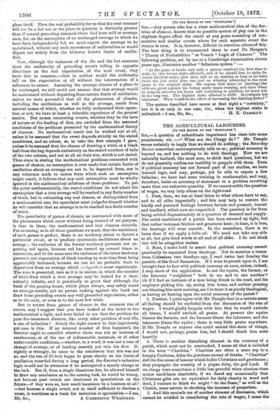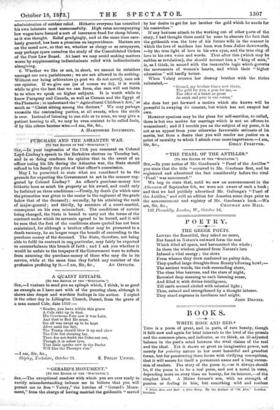THE AGRICULTURAL LABOURERS.
[TO THR EDITOR OP TEl " &ROTATOR:1 Slit,—A question of subordinate importance has risen into some- prominence, viz. :—" What can the Clergy do ? " Mr. Temple seems certainly to imply that we should do nothing ; the Saturday, Review somewhat contemptuously tells us so ; political economy beyond us, and has nothing to do with theology. Now we are- naturally inclined, like most men, to shirk hard questions, but we do not generally confess our inability to grapple with them. Even if political economy has not formed part of our studies, we have- learned logic, and may, perhaps, yet be able to expose a fevr- fallacies ; we have had some training in mathematics, and may, therefore, insist on accuracy of statement in a problem involving- more than one unknown quantity. If we cannot settle the question- of wages, we may help others on the right road.
1. First, then, we can at least listen to what others have to say, and to all alike impartially ; and this may help to restore the- kindly and personal feelings between farmer and peasant, tenant and landlord, which now are imperilled. The question is far from being settled dispassionately as a question of demand and supply. The social machinery of a parish has been screwed up tight, but that rather increases friction and generates heat ; in time, it is true, the bearings will wear smooth. In the meantime, there is no harm done if we apply a little oil. We need not take any side at all, but give kind words to all and of all alike. I do not think this will be altogether useless.
2. Next, I make bold to assert that political economy cannot practically be separated from theology. Not to mention a lesson from Colossians two Sundays ago, I read twice last Sunday the
parable of the Good Samaritan. If I were to preach upon it, I am. brought face to face with political economy at once, unless, indeed, I atop short of the application. Is not the squire, the farmer, or- the labourer " neighbour " both to me and to one another?' Or if I find an instance of a man being drunk in the road, and his employer picking him up, seeing him home, and neither praising- nor blaming him next morning, am Ito treat it as purely theological, as having no bearing upon the social economy of the parish'?
3. Further, I quite agree with Mr. Temple that in a certain sense all feeling should be excluded from the discussion of the rise of' wages. I would gladly bargain with him that he would exclude all blame, I would exclude all praise. At present the squire- blames the farmers, and the farmers blame the labourers, and the labourers blame the squire ; there is very little praise anywhere. If Mr. Temple or anyone else could amend this state of things,. I would not, perhaps, praise him, but I should thank him most heartily.
4. There is another disturbing element in the economy of a parish, which must not be overlooked, I mean all that is included in the term "Charities." Charities are often a mere sop to a hungry Cerberus, doles the purchase money of thanks. "Charities" dull the fine sense of honour which befits Christians and gentlemen; they propagate the worship of a pagan deity, the god Luck. If we clergy were sometimes a little less grateful when election-time makes candidates charitable, if we dared say occasionally that Christmas gifts are no equivalent for daily charity in word and deed, I venture to think we might "do the State," as well as the Church, some service in checking the increase of pauperism.
5. And this reminds me of another element of discussion, which cannot be avoided in considering the rate of wages, I mean the
his own interests most unsuccessfully. High rates accompanying low wages have formed it sort of insurance fund for cheap labour, as it was thought. Relief grudgingly, and at the same time care- lessly granted, has been a premium on improvidence. Matters are en the mend now, so that we, whether as clergy or as ratepayers, may perhaps spare ourselves the study of the Consolidated Orders .of the Poor Law Board. At least we may avoid making matters worse by supplementing indiscriminate relief with indiscriminate --almsgiving.
6. Whether we like or not, in short, we cannot be outsiders amongst our own parishioners; we are not allowed to do nothing. Without our being arbitrators (a post we do not covet), men ask -our opinion. If we give one (as of course we do), it is worth while to give the best that we can form, else men will not listen to us when we speak on higher subjeets. It is worth while to *now Paraguay and Canada, as well as Canaan and the Egypt of thePharaohs ; to understand the" Agricultural Children's Act," as much as " Christ sitting among the doctors." We may perhaps -recant:Ale the contending parties, at all events, when the strife is over. Instead of listening to one side or to none, we may give a patient hearing to all, we may be even content to be called fools, if by this others 'become wise.-1 am, Sir,lce., A HAMPSHIRE INCUMBENT.



































 Previous page
Previous page